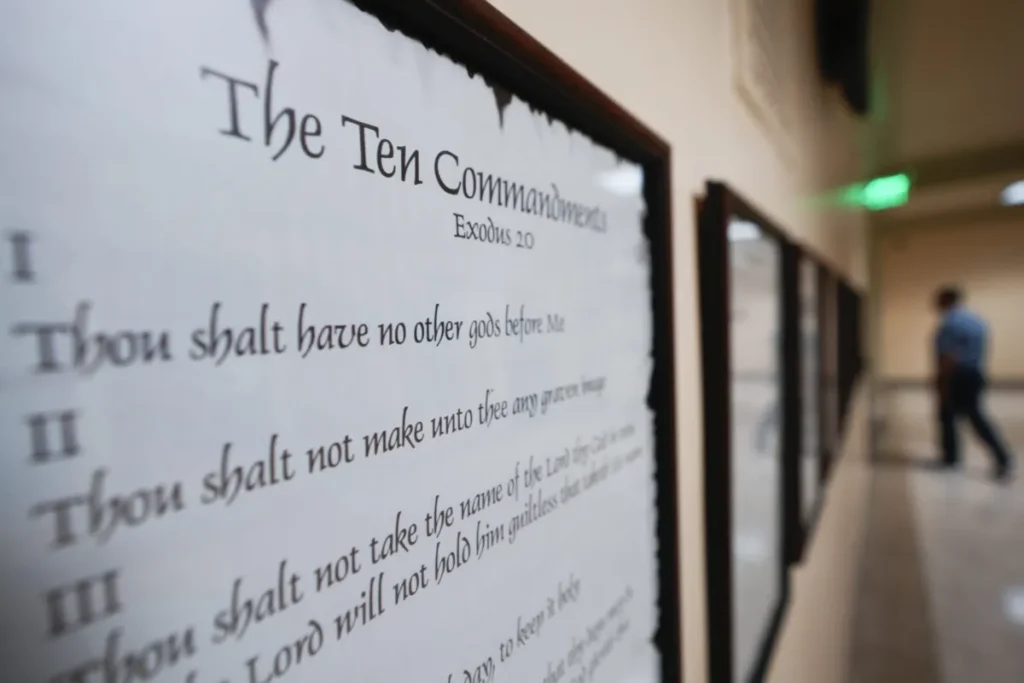New Louisiana law requiring classrooms to display Ten Commandments churns old political conflicts

by KEVIN McGILL Associated Press and SARA CLINE Associated Press
A bill signed into law this week makes Louisiana the only state to require that the Ten Commandments be displayed in every classroom in public schools and colleges—a move that stirs the long-running debate over the role of religion in government institutions.
Under the new law, all public K–12 classrooms and state-funded universities will be required to display a poster-sized display of the Ten Commandments in a “large, easily readable font”” next year.
Civil liberties groups planned lawsuits to block the law, signed by Republican Gov. Jeff Landry, saying it would unconstitutionally breach protections against government-imposed religion. “We’re going to be seeing Gov. Landry in court,” said Rachel Laser, president and CEO of Americans United for Separation of Church and State.
State officials are stressing the history of the Ten Commandments, which the bill calls “foundational documents of our state and national government.”
Similar bills requiring the Ten Commandments be displayed in classrooms have been proposed in other statehouses, including Texas, Oklahoma, and Utah.
Reasonable and needed or unconstitutional and harmful? At Archbishop Shaw High School, a Catholic-run school in suburban New Orleans, Head of School the Rev. Steve Ryan said he was pleased that the Ten Commandments will be posted on public school walls.
“These laws, which are part of the Judeo-Christian tradition, are good safeguards for society. They are actually reasonable,” Ryan said.
In Baton Rouge, Attorney General Liz Murrill, a Republican ally of Landry, said she was looking forward to defending the law.
“The 10 Commandments are pretty simple (don’t kill, steal, cheat on your wife), but they also are important to our country’s foundations,” she said on social media.
Opponents of the law argued that eroding the constitutional barrier between religion and government is illegal and unfair.
“We’re worried about public school families and students in Louisiana,” Laser said. “They come from a variety of different traditions and backgrounds, different religious beliefs, nonreligious beliefs, and students in those classrooms will be made to feel like outsiders when they see the government endorsing one set of narrow religious beliefs over others.”
Chris Dier, Louisiana’s 2020 teacher of the year, echoed those fears, and said he doesn’t intend to post the Ten Commandments in his classroom.
“I don’t believe in doing something that is unconstitutional and harmful to students,” he said. It is unclear whether there is a punishment for refusing to comply with the mandate.
The law was praised by former Alabama Supreme Court Chief Justice Roy Moore, who was removed from office in 2003 after disobeying a federal judge’s order to remove a 5,280-pound (2.4 metric tonne) granite Ten Commandments display from the state court building.
“Nobody can make you believe in God. Government can’t tell you that, but it must acknowledge the God upon which this nation is founded,” Moore said.
Members of the Islamic Society of North America and the Council on American-Islamic Relations (CAIR) expressed concerns about the law.
“Is it to highlight universal principles that everyone should embrace? Or is the intent to send a message to Muslim students or others that “Your religion—not welcome here, only one understanding of one religion is welcome here?’” said Edward Ahmed Mitchell, national deputy director of CAIR.
Mitchell said Muslims respect the Ten Commandments, which are largely reinforced by similar passages throughout the Quran and the teachings of the prophet Muhammad, but that the context is troubling for reasons, including the use of a Ten Commandments translation associated with evangelicals and other Protestants.
Earlier Ten Commandments controversies
In 1980, the U.S. Supreme Court ruled that a similar Kentucky law violated the establishment clause of the U.S. Constitution, which says Congress can “make no law respecting an establishment of religion.” The high court found that the law had no secular purpose but rather, served a plainly religious purpose.
In its most recent rulings on Ten Commandments displays, the Supreme Court held in 2005 that such displays in a pair of Kentucky courthouses violated the U.S. Constitution. At the same time, the court upheld a Ten Commandments marker on the grounds of the Texas state capitol in Austin. Those were 5-4 decisions, but the court’s makeup has changed, with a 6-3 conservative majority now.
The main differences in the two cases—at least, according to the one swing vote, then-Justice Stephen Breyer—was that the Kentucky county officials demonstrated an unmistakable track record of religious motives in the posting, while the motives behind the Texas display were more on the “borderline” between religious and secular. In addition, Breyer said, the Texas monument had passed a test of time, standing among other monuments for decades without legal challenge.
Other religion-government fights
After he was removed as chief justice of Alabama Supreme Court in 2003 for his refusal to remove the Ten Commandments monument, Moore was elected to the post again, but was suspended from the bench in 2016 after a judicial discipline panel ruled he had urged probate judges to refuse marriage licenses to same-sex couples. Moore disputed the accusation.
Louisiana has had a prominent role in the church-state legal fight before. In 1987, the Supreme Court struck down a 1981 Louisiana statute that required instruction about evolution to be accompanied by teaching about “creation science.” The court found that the statute had no identifiable secular purpose and the “pre-eminent purpose of the Louisiana Legislature was clearly to advance the religious viewpoint that a supernatural being created humankind.”
Mississippi has mandated the display of “In God We Trust” in schools since 2001. Louisiana passed a similar mandate that became law last year.
The latest pushes to post the Ten Commandments follow a major victory for the religious right in 2022: The Supreme Court ruled that a high school football coach in the state of Washington who knelt and prayed on the field after games was protected by the Constitution.
How the Ten Commandments are viewed
Jews and Christians regard the Ten Commandments as having been given by God to Moses, according to biblical accounts, on Mount Sinai. Not every Christian tradition uses the same Ten Commandments. The order varies as does the phrasing, depending on which Bible translation is used. The Ten Commandments in the signed Louisiana legislation are listed in an order common among some Protestant and Orthodox traditions.
Disputes over the law probably will not be about only whether the commandments should be mandated on schoolroom walls, but also which version should be used, said James Hudnut-Beumler, a professor of American religious history at Vanderbilt University in Nashville, Tenn. “The Ten Commandments always look universal until you put a shortened list up on the wall and discover that there’s room for dispute,” he said.








